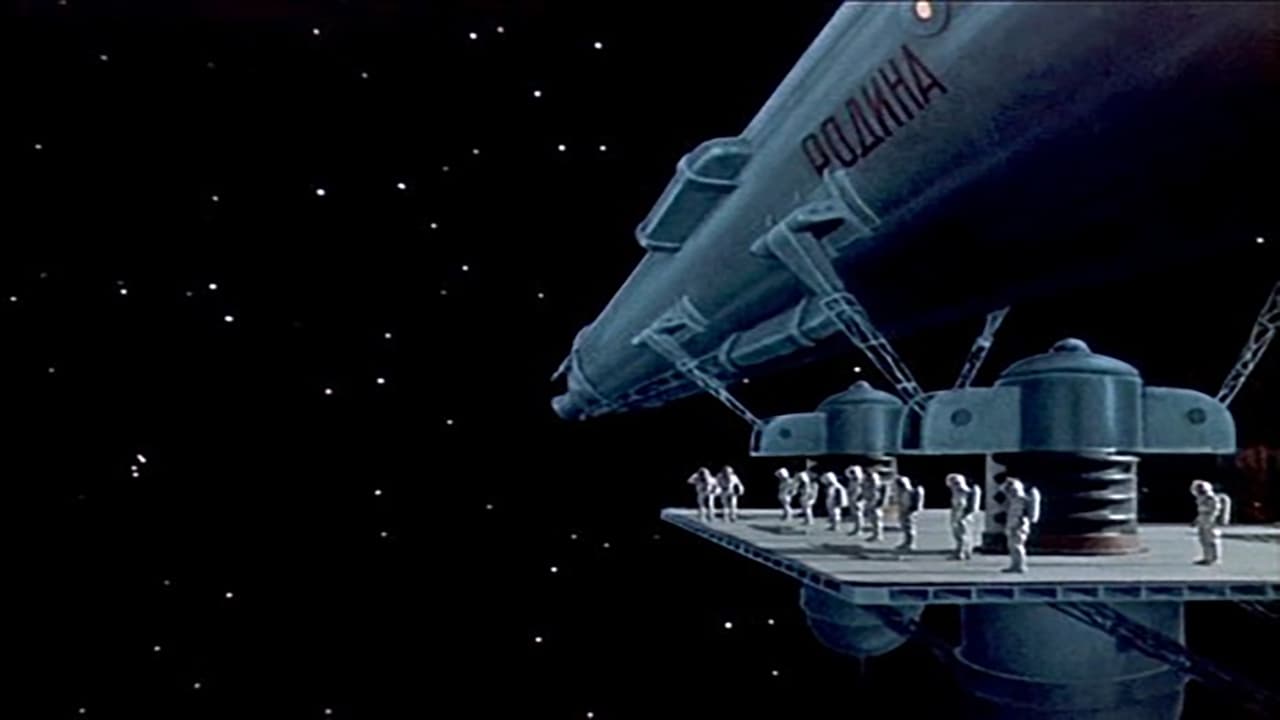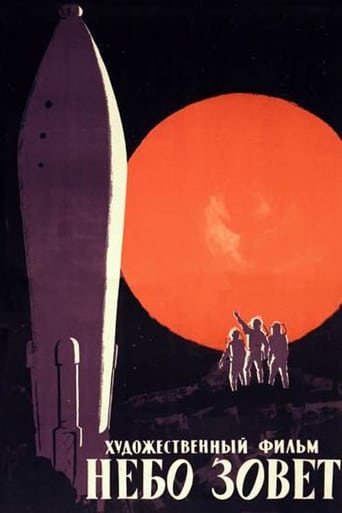BroadcastChic
Excellent, a Must See
Stoutor
It's not great by any means, but it's a pretty good movie that didn't leave me filled with regret for investing time in it.
Merolliv
I really wanted to like this movie. I feel terribly cynical trashing it, and that's why I'm giving it a middling 5. Actually, I'm giving it a 5 because there were some superb performances.
Tayloriona
Although I seem to have had higher expectations than I thought, the movie is super entertaining.
Max Nemtsov
Like most soviet films of the period (and I watched the original version), in has no action whatsoever. The plot is stilted as statues at the People's Economy Achievements Exhibition in Moscow, and the story drags its feet to no end. It is a typical tableau vivant aimed at kicking imperialist America one more time, and at showing Russians (but mostly Ukrainians, as the film was done at the infamous Dovzhenko Studios, legendary for its spectacularly bad productions) at their best and foremost.However, this propaganda poster about how Soviets and Americans tried to prove to each other whose penis extender—pardon me, phallic symbol—is better, racing each other to Mars, of all places, is nicely illustrated with analog FX. The music is abominable, and is in place only in the scene of "space madness" of the one "bad American" they let out into space. The dialogue is absurdist and as ridiculous as the gadgetry shown. More than anything else, it reminds me of the old Chapayev joke: —Pet'ka, the apparatus. —Six, Vasily Ivanovich. —Six what? —Apparatus what? In some sense, it's just as silly as Gravity. Look how much time passed, and what has changed?Nevertheless, content-wise, the film's narrow-minded positivism and typical soviet jingoism is set off by one truly Pynchonian twist, and you can appreciate it if you read Gravity's Rainbow. The film has its own Gottfried, and there is the Gottfried glorious moment there. A-and Gottfried's name in the film is Grigory.
Woodyanders
As everyone already knows, Roger Corman got his hands on an ambitious Russian space opera and had a then unknown Francis Ford Coppola drastically re-edit it into a 64 minute piece of pure schlock complete with poor dubbing, cornball narration, and, most notoriously, a couple of cheesy looking monsters that hilariously resemble male and female genitalia. The sequence with these two ridiculous creatures kicks the picture over the delightfully campy goal post as these obscene things engage in a pathetic fight for a whopping two minutes. As for the rest, the special effects are quite good and convincing for their time, the sets are likewise impressive, the space rescue story manages to generate real suspense and excitement, and there are moments of striking visual splendor that neatly predate "2001: A Space Odyssey." Moreover, the central premise about two great nations fiercely competing against each other over which one will reach Mars first nicely captures the tension of the Cold War era. A fun cheapie quickie take on a foreign sci-fi feature.
keith-moyes-656-481491
I saw this movie in its UK premier at the National Film Theatre. It is the original Russian version with subtitles. It was 67 minutes long and this seems about right for its slim story. I doubt if the rumours of a two hour version are true.The print was in decent shape, with only the occasional scratch, but the image quality wasn't great. I don't know if this was due to the mediocre quality of the original film stock, or was simply because this was only a 16mm print.If you only know of this film from Corman's Battle Beyond the Sun and are anxious to see it in its original form, don't get your hopes up. The special effects and production design are 'state of the art' for 1959 but everything else is quite poor.The story is very simple but is OK in its general outline.It starts with a writer being shown around a Soviet space exhibition. He sits down at a desk looking thoughtful and the rest of the movie is his daydream.An American rocket lands on a Soviet space station on its way to Mars. The Americans learn that the Russians are also planning a Mars mission and are ordered to set off immediately in order to beat them there. In their hurry to take off they accidentally injure a Russian cosmonaut.Because they have set off before Mars is in the correct position, they run out of fuel. The Russians heroically shelve their own Mars attempt in order to mount a rescue mission. The rescuers encounter a meteor shower that may or may not have some effect on their spaceship. Eventually they pick up the Americans but also run out of fuel. They land on an asteroid called Icarus, for no obvious reason. The Russians then send them an unmanned fuel rocket which crashes on Icarus, also for no obvious reason. A second fuel rocket is sent and does manage to land safely, but one of the Russians dies (you guessed it) for no obvious reason.This all sounds fair enough, but the movie makers had only the most elementary idea of how to tell a story in cinematic terms.The screenplay is very lumpy. It lingers on scenes of marginal importance (and interest) and then omits crucial scenes altogether, so the story jerks forward with scant regard for either temporal or spatial continuity. Basic information, needed to follow what is actually happening on the screen, is given in the wrong place or is too cryptic to really make sense (poor sub titles didn't help). Scenes frequently begin without any preparation and it is only half-way through that anyone bothers to explain what is going on. Sometimes they never do and the visuals are too opaque to fill in the gaps.The director is more concerned with creating beautifully composed images than generating atmosphere and tension - or even just telling the story. Scenes begin with pointless lingering close ups of people looking thoughtful. Sometimes we learn what they were thinking and sometimes not. They then wander aimlessly around the (often superb) sets with no point or purpose before clustering together and striking poses that might look good in stills but make no dramatic sense. The actors are left to fend for themselves.In Hollywood it has often been said that when a good director dies he becomes a cinematographer. If Mikhail Karzhukov was ever a good director he must have been dead long before this movie was made.The overall impression is that Nebo Zovyot is not a narrative movie so much as a series of 'tableau vivants'. It resembles an early silent movie, where the inter titles explain what is going on and the subsequent scenes are merely illustrations - except that here there are no inter titles.Interestingly, the other East European SF films made around this time which I have now seen in their original versions, Mechte Navstrechu, Planeta Burg, Der Schwiegende Stern and Ikarie-XB1, are all more or less the same. This suggests that Soviet Bloc film makers were working in a bubble with very little access to movies made elsewhere. Stylistically, they were all stuck in the Silent era, when Soviet film-making had been cutting edge.I know some people might accuse me of being culturally blinkered: trying to impose Western story-telling conventions on a film made in a different cinematic tradition, with different aesthetic values and artistic priorities. I have considered this possibility.They are wrong.PS: Many aspects of this review are even more pertinent to Mechte Navstrechu, the other SF film premiered in this NFT season.PPS: The British Film Institute is currently negotiating with a Danish company to release these old Soviet era SF films on DVD (hopefully with full digital restoration) so many other people will be able to judge them for themselves.
dane-92
From the very beginning, I was impressed with the quality of the special effects in this movie which, I agree with other reviewers, were very good for their time. The obligatory monster scene on the Mars moon is mercifully short...and if you can just hold your nose through that part, the rest of the film is good enough to make you feel you're really up there with them. I liked the message of the film too, even if it wasn't the original intention of the longer communist propaganda flick. I disagree with those who completely pan Battle Beyond the Sun. I thought much of it was convincing sci-fi, and I'd recommend viewers judge it for themselves.

